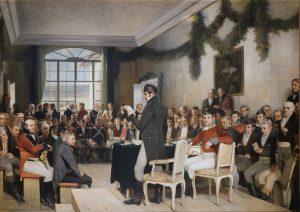Archive, Letters
Letter on Election
Norway is getting ready for a parliamentary election on 8 September. To assist preparation, the Council of Norwegian Bishops has produced a pastoral letter which was read out at all Masses throughout the country today. You can find the text below:
Praised be Jesus Christ!
1. Norway will soon hold elections to parliament. We are called to choose representatives who will govern our country for the next four years on our behalf and for the common good. Voting is not only a right; it is a demanding and weighty duty.
(Prayer for the election)
2. Every serious decision should be brought to God in prayer. That includes how we cast our vote in parliamentary elections. Let us therefore ask for the Holy Spirit’s light and help: «Come, Thou Holy Spirit, come! / And from Thy celestial home / Shed a ray of light divine! » (Pentecost Sequence). Let us also pray that those elected to parliament may serve our fatherland faithfully and conscientiously.
(Purpose of the pastoral letter)
3. As your bishops, we wish to share a few thoughts with you before the election. They arise from the Church’s social teaching, which is grounded in our holy faith and in reason, and which concerns the human person and life in society.
4. It is not our role as bishops to tell you how to vote. Our hope is rather that the basic principles we outline here will aid your own discernment about which party to support. As we seek God’s guidance, we should also take counsel from the Church’s teaching.
(Our shared responsibility for society)
5. Our Lord’s command of charity obliges us, as Catholics, to work for a good and just society. Though Catholics are few in Norway, we may not disclaim our shared responsibility, either for society or for the well-being of our neighbor. We therefore consider it especially important that all eligible Catholic voters make use of their vote and weigh their choices carefully before election day.
6. The Church teaches that the lay faithful have the distinctive vocation to «seek the kingdom of God by engaging in temporal affairs and by ordering them according to the plan of God» (Lumen Gentium 31). Responsible, creative political engagement is one way to live this call and to contribute to society’s authentic development. As bishops, we hope more of the faithful will embrace such engagement in the years ahead.
(Human life and dignity)
7. Human life and human dignity, from conception to natural death, are God’s gift and are inviolable. No person – whether an unborn child, the incurably ill, a newly arrived refugee, or a victim of violence or human trafficking – may be set aside or counted of lesser worth than the rich, the powerful, or the famous.
8. We are troubled by the apparent growth of support for euthanasia in our country and among our politicians. All who suffer from pain or illness should receive every form of care we can offer, as should their families and those who look after them. To «help» someone die helps no one.
9. Religious freedom is rooted in human dignity. In a nation like ours, committed to universal human rights, it is essential to ensure that everyone – individually and together with others – can seek faith and live responsibly in accordance with that faith.
(Human communities)
10. As human beings, we are created to live in community with others. True and healthy human communities should mirror the Trinity: the communion of the Father, the Son, and the Holy Spirit. The first and most important human community is the family, the cornerstone of society. The family must be protected and strengthened, for it benefits every member and the whole of society.
11. A good and just society is built through durable, well-considered measures. Such measures emerge from political discourse – both in parliament and in public life – guided by reason, integrity, and a willingness to cooperate. Let us be vigilant when offered seemingly simple fixes to very complex social and political problems. Such fixes are easily superficial and can make matters worse.
12. Our shared responsibility for our neighbor does not end at Norway’s borders. It is not enough that we ourselves are comfortable and have all we need. Work for the common good cannot cease until all people – the entire human family – live in peace and security, with food on the table and a roof overhead. In a world marked by war, fear, and uncertainty, our nation should build upon and expand Norway’s extensive service for the world and in the world. We must beware of becoming self-satisfied and turned in on ourselves.
(Care for the poor)
13. The Lord drew especially close to the poor. As his disciples, so must we. Poverty in its many forms is spreading, even in our welfare state. Each year we hear of people who cannot afford heat in winter or food at Christmas, and of children left out because family means are insufficient for school or leisure activities. Many – especially among the elderly – also suffer crushing loneliness. These and other forms of poverty are intolerable. It is incumbent upon us as Christians to bring about change. We expect the incoming parliament to assume greater responsibility for those who struggle in our midst and for those in need beyond our borders.
(Conclusion)
14. St. Olav, Norway’s eternal king, helped found our country upon the values of the Gospel, upon the message and example of Jesus Christ. At this election, let each of us recognize our responsibility to build upon the saint-king’s work.
May the almighty and merciful God bless you all!
Given for the 22nd Sunday in Ordinary Time
30 – 31 August 2025
+Erik Varden +Fredrik Hansen

Oscar Wergeland, Eidsvold 1814 – Norway’s perhaps most famous painting, depicting the constitutional assembly.
